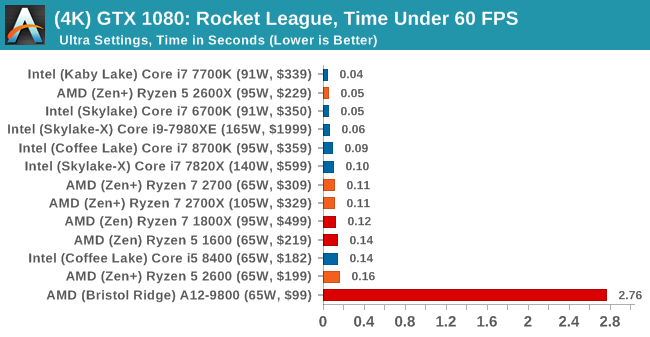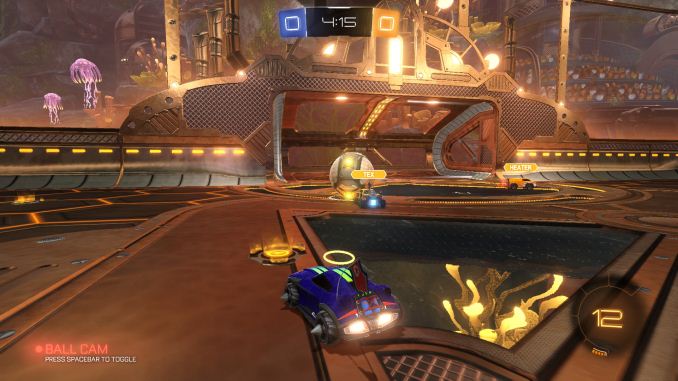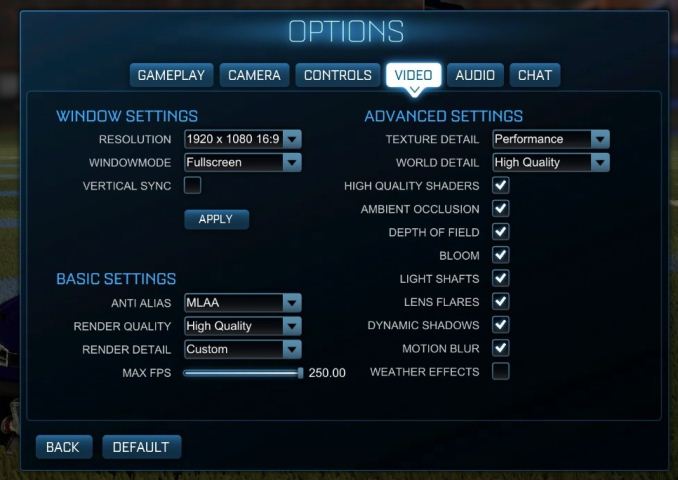The AMD 2nd Gen Ryzen Deep Dive: The 2700X, 2700, 2600X, and 2600 Tested
by Ian Cutress on April 19, 2018 9:00 AM ESTRocket League
Hilariously simple pick-up-and-play games are great fun. I'm a massive fan of the Katamari franchise for that reason — passing start on a controller and rolling around, picking up things to get bigger, is extremely simple. Until we get a PC version of Katamari that I can benchmark, we'll focus on Rocket League.
Rocket League combines the elements of pick-up-and-play, allowing users to jump into a game with other people (or bots) to play football with cars with zero rules. The title is built on Unreal Engine 3, which is somewhat old at this point, but it allows users to run the game on super-low-end systems while still taxing the big ones. Since the release in 2015, it has sold over 5 million copies and seems to be a fixture at LANs and game shows. Users who train get very serious, playing in teams and leagues with very few settings to configure, and everyone is on the same level. Rocket League is quickly becoming one of the favored titles for e-sports tournaments, especially when e-sports contests can be viewed directly from the game interface.
Based on these factors, plus the fact that it is an extremely fun title to load and play, we set out to find the best way to benchmark it. Unfortunately for the most part automatic benchmark modes for games are few and far between. Partly because of this, but also on the basis that it is built on the Unreal 3 engine, Rocket League does not have a benchmark mode. In this case, we have to develop a consistent run and record the frame rate.
Read our initial analysis on our Rocket League benchmark on low-end graphics here.
With Rocket League, there is no benchmark mode, so we have to perform a series of automated actions, similar to a racing game having a fixed number of laps. We take the following approach: Using Fraps to record the time taken to show each frame (and the overall frame rates), we use an automation tool to set up a consistent no-bot match on easy, with the system applying a series of inputs throughout the run, such as switching camera angles and driving around.
It turns out that this method is nicely indicative of a real match, driving up walls, boosting and even putting in the odd assist, save and/or goal, as weird as that sounds for an automated set of commands. To maintain consistency, the commands we apply are not random but time-fixed, and we also keep the map the same (Aquadome, known to be a tough map for GPUs due to water/transparency) and the car customization constant. We start recording just after a match starts, and record for 4 minutes of game time (think 5 laps of a DIRT: Rally benchmark), with average frame rates, 99th percentile and frame times all provided.
The graphics settings for Rocket League come in four broad, generic settings: Low, Medium, High and High FXAA. There are advanced settings in place for shadows and details; however, for these tests, we keep to the generic settings. For both 1920x1080 and 4K resolutions, we test at the High preset with an unlimited frame cap.
All of our benchmark results can also be found in our benchmark engine, Bench.
MSI GTX 1080 Gaming 8G Performance
1080p



4K
















545 Comments
View All Comments
FaultierSid - Wednesday, April 25, 2018 - link
The question is if testing a CPU at 4K Gaming does make much sense. At 4K the bottleneck is the GPU, not the CPU, especially since they tested with a 1080 and not a 1080TI.It is not a coincidence that the cpus all are showing roundabout the same fps in the 4K tests. Civilization seems to be easier on the GPU and shows 8700K in the lead, all other games show almost same fps for all 4 tested CPUs. Thats because the fps is limited by GPU in that case, not by the CPU.
You might want to bring up the point that if you are Gaming in 4K and at highest settings, it doesn't make sense for you to look at 1080p benchmarks. And right now this might make sense, but not in a couple years when you upgrade your GPU to a faster model and the games are not GPU bottlenecked anymore. Then where you now see 60fps you might see 100 fps with an 8700K and only 80fps with the Ryzen 2600X.
Basically, testing CPUs in Gaming at a resolution that stresses out the GPU so much that the performance of the CPU becomes almost irrelevant is not the right way to judge the Gaming Performance of a CPU.
If your point is that at the time you purchase a new GPU you will also purchase a new CPU, then this might not affect you, and you decide to pick the 2700X over an 8700K because of all the advantages in other areas.
But in general, we have to admit, the crown of "best gaming CPU" is (sadly) still in Intel's Corner.
mapesdhs - Monday, May 14, 2018 - link
If all you're doing is gaming at 4K then yes, in most titles thebottleneck will be the GPU, but this is not always the case. These days live streaming on Twitch is becoming popular, and for that it really does help to have more cores; the load is pushed back onto the CPU, even when the player sees smooth updates (the viewer side experience can be bad instead). GN has done some good tests on this. Plus, some games are more reliant on CPU power for various reasons, especially the use of outdated threading mechanisms. And in time, newer games will take better advantage of more cores, especially due the compatibility with consoles.jjj - Wednesday, April 25, 2018 - link
So what was wrong, was it HPET crippling Intel or does Intel have some kind of issue with 4 channels memory?Ryan Smith - Wednesday, April 25, 2018 - link
The former.risa2000 - Thursday, April 26, 2018 - link
Can you explain a bit HPET crippling? I was looking around Google, but did not find anything really conclusive.Uxot - Wednesday, April 25, 2018 - link
So...i have 2666mhz RAM...RAM support for 2700X says 2933...what does that mean ? is 2933 the lowest ram compatibility ? FML if i cant go with 2700X bcz of ram.. -_-Maxiking - Thursday, April 26, 2018 - link
It refers to the highest OFFICIALLY supported frequency by the chipset on your mobo. You should be able to run RAM with higher clocks than 2933 but they might be issues. Because Ryzen memory support sucks. For higher clocked rams, I would check it they are on the QVL, so that way, you can be sure, they were tested with your mobo and no issues will arrise.2666mhz RAM will run without any issue on your system.
johnsmith222 - Thursday, April 26, 2018 - link
Make sure you have the newest bios update, AGESA 1.0.0.2a seems to improve memory compatibility too. My crappy kingston 2400 cl17 now works fine at 3000 cl15 1.36V. I'll try 3200 at 1.38V later.Uxot - Wednesday, April 25, 2018 - link
Ok...my comment got deleted for NO REASON...Gideon - Thursday, April 26, 2018 - link
Good work tracking down the timing issues! I know that this review is still WIP, but just noticed that the "Power Analysis" block has a "fsfasd" written right after it, that probably isn't needed :)